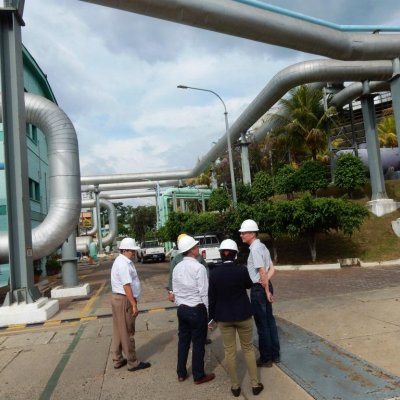How to make a viable geothermal project
Icelandic and Japanese experts lead intensive geothermal project development training course under the Geothermal Training Program
“This course is very useful for my work as geothermal geologist and I have learned many new things” says Ana Garcia Diego Martinez, a geologist from the Mexican Federal Energy Commission. “In Mexico we are planning to develop a number of new geothermal fields and this course provides us with an opportunity to learn from countries like Iceland where geothermal energy development is highly sophisticated.”
Nordic Development Fund (NDF) participates in the completion of an intensive training course on geothermal project development. Icelandic and Japanese experts conduct the one-week course which focuses on financial opportunities and modalities, social and environmental aspects including job creation, and new non-traditional geothermal applications. The course forms part of the 2015 Geothermal Diploma Course which takes place from June-November in El Salvador.
“I am happy to see the high professional level of the participants and the broad composition covering both technical and management levels” says Dr. Bjarni Pálsson from Landsvirkjun, The National Power Company of Iceland, and continues: “The real value in this type of course and programme is that different disciplines work together to solve practical exercises related to geothermal project development such as risk assessment and financial viability.” Dr. Pálsson is an international geothermal finance expert and lead instructor of the one-week training course.
The course participants are 31 diploma students from Argentina, Colombia, Ecuador, El Salvador, México, Nicaragua, and Peru. The students come from national energy authorities, state corporations, private companies, and research institutions. The NDF support includes scholarships to cover costs for participation in the 5-month training course. During the 5 months of training, the students will be trained in topics such as: Exploration geology, geochemistry and geophysics, drilling techniques for geothermal wells, geothermal plant planning, environmental and social management of geothermal projects. In addition, students will have field experience through visits and internships at different geothermal exploration sites in El Salvador.
Geothermal energy for power generation has an enormous potential in Central America and the Andean Region, where in the latter region not a single geothermal plant is currently producing electricity. There is further considerable interest from the respective governments, investors and project developers in promoting the use of geothermal energy.
The development of geothermal energy for electricity generation in Latin America will make a significant contribution to lower GHG emission levels while increasing energy supply security and decoupling economic growth from GHG emission growth. Furthermore, geothermal development will increase the competitiveness of local industries; and thereby via the associated direct and indirect employment effects significantly improve the basis for poverty reduction and social development in the region.
The one-week course is organised by the National Energy Council, University of El Salvador, and the geothermal company LAGEO with financing from NDF, Inter-American Development Bank (IDB), and Japan International Cooperation Agency (JICA).


